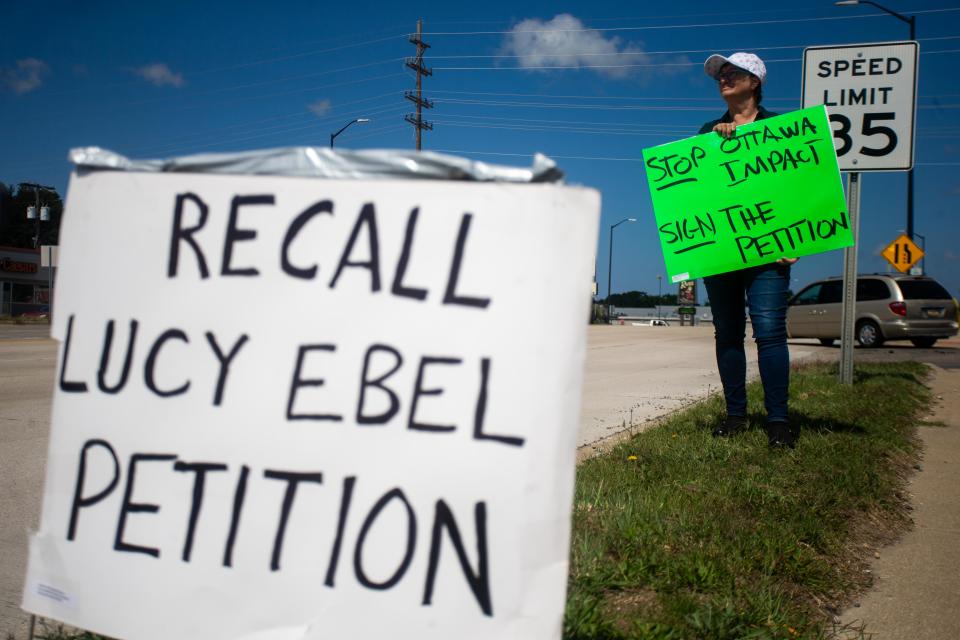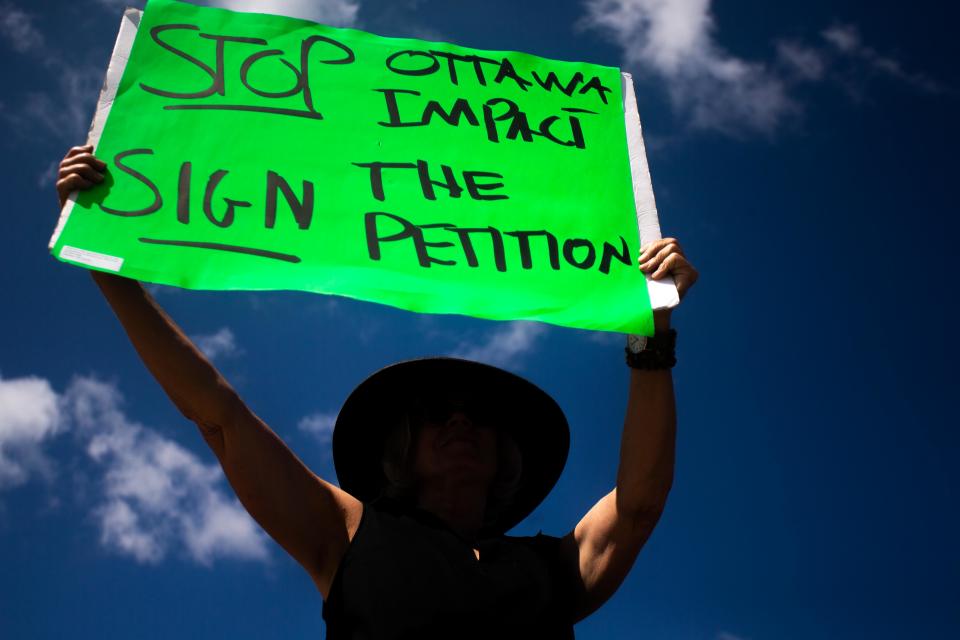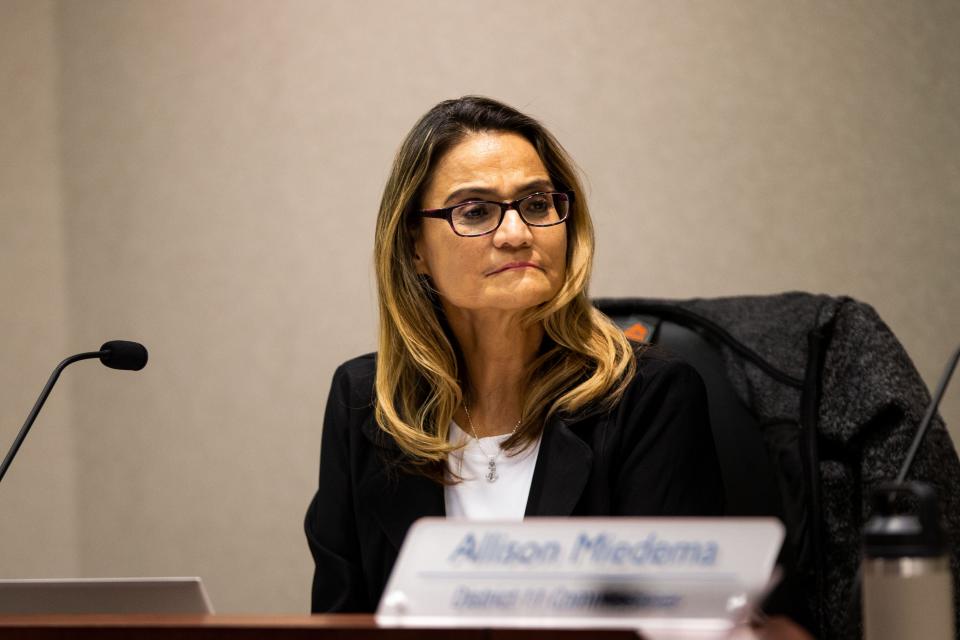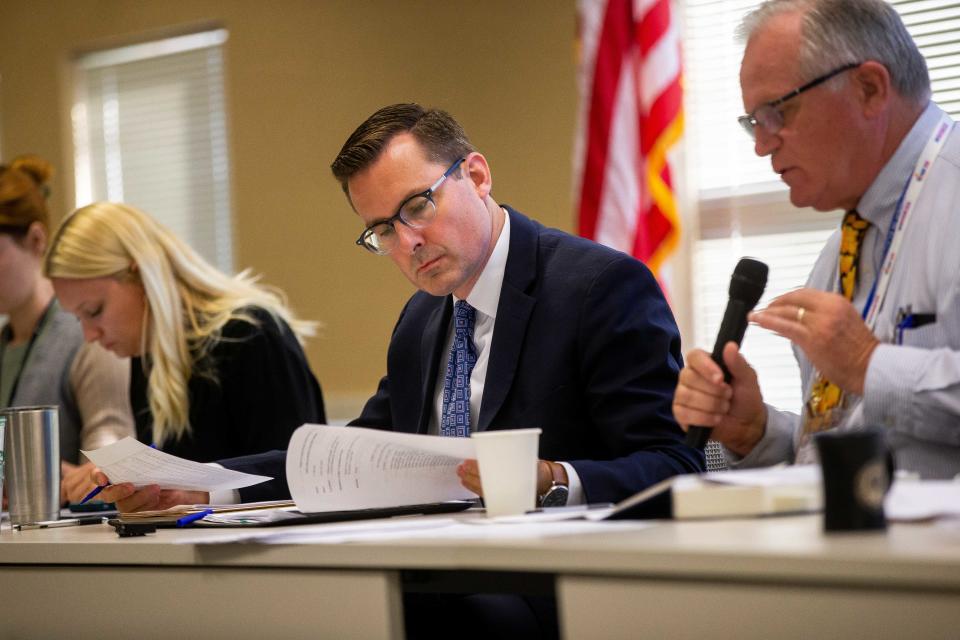In complex process, Ebel recall must wait for May ballot
OTTAWA COUNTY — The recall effort targeting Ottawa County Commissioner Lucy Ebel is almost certainly now delayed until May.
After a judge in Kent County denied District 2 Commissioner Ebel's appeal over recall petition language Friday, Aug. 25, signature gathering resumed to put the election on the ballot.

The appeal, however, delayed the process long enough the effort won't be able to meet Michigan's strict timeframe for recalls.
Ebel is a member of Ottawa Impact, which currently has a six-member majority on the county board. The far-right fundamentalist group was formed in 2021 over frustrations with the county and state over COVID-19 mitigation measures.
Since taking office, Ebel and other Ottawa Impact-linked commissioners have pushed through a series of controversial decisions, including firing the previous county administrator and former corporation counsel, demoting the county health officer and eliminating the county's Diversity, Equity and Inclusion Office.
Those decisions have resulted in two pending lawsuits against the commission and a six-week investigation from Michigan Attorney General Dana Nessel.

What's the process?
A recall election (also known as a recall referendum, recall petition or representative recall) is a procedure by which voters can remove an elected official from office before their term has ended.
All elected officials in the state, except judicial officers, are eligible to be recalled by the voters of their districts.
The current process includes 21 steps, according to information provided by the Ottawa County Clerk's Office.
For countywide recalls, the process begins when a petitioner submits language to the clerk's office. The recall language for Ebel was submitted on July 3, the first day Ottawa County Commissioners were eligible.
That's because Michigan law says any elected official serving a two-year term — like the current commissioners — can't be the subject of recall in the first or last six months of their term.

The petition language must be reviewed by the Ottawa County Election Commission "not less than 10 or more than 20 days" after receiving the draft petition. The county election commission held a public hearing July 17 to determine whether each reason for the recall stated in the petition is "factual and of sufficient clarity" to be certified for the ballot.
The language states: “On Feb. 28, 2023, Commissioner Lucy Ebel voted for a motion to correct the previous board of commissioners’ Dec. 13, 2022, resolution that appointed Adeline Hambley as administrative health officer for Ottawa County. Commissioner Ebel voted for the motion after Ms. Hambley challenged in court the commission’s designation of her status as interim health officer.”
The election commission — comprised of County Clerk Justin Roebuck, County Treasurer Amanda Price and Probate Judge Mark Feyen — unanimously approved the language, triggering the signature-gathering process.
The recall effort must submit a minimum number of signatures that matches the 25 percent threshold of the number of voters who cast a ballot in the most recent gubernatorial race in Ebel's district, where 9,920 votes were cast. That means the recall effort must gather at least 2,480 signatures.
The Committee to Recall Lucy Ebel began gathering signatures on July 18 and reportedly had more than half the needed signatures when Ebel filed her appeal July 26 of the election commission's approval of the petition language. Michigan law dictates she had 10 days from the commission's ruling to appeal to the courts — she filed on day nine.
More: Judge denies commissioner's appeal over recall language
According to state statute, all signature gathering must stop once the appeal is filed — which it did — until 40 days passes or a circuit court judge makes a determination to grant or deny the appeal (whichever is sooner). On Aug. 25, the appeal was denied in a matter of minutes, however, that totaled almost a month of no signature collecting for the recall effort.
The window to gather signatures technically began July 18, based on the presumption Ebel wouldn't appeal. Because she did, officials believe the window to gather signatures reset after the ruling, not leaving enough time for the committee to complete their goal by the Sept. 4 deadline to have the measure certified for November.
That's according to Roebuck's interpretation of state law, based on guidance from the Michigan State Board of Canvassers.
"The plain reading of the law simply states that if an appeal is made, the petition 'is not valid for circulation … until a determination … is made by the circuit court, or until 40 days after the date of appeal,'" Roebuck told The Sentinel on Wednesday. "Therefore, we believe that once an appeal is made, the clock on the petition starts once the court makes a decision on the appeal, or after 40 days, whichever is sooner."

The statute that Roebuck references says: "The determination by the board of county election commissioners may be appealed by the officer whose recall is sought or by the sponsors of the recall petition drive to the circuit court in the county. The appeal must be filed not more than 10 days after the determination of the board of county election commissioners.
"If a determination of the board of county election commissioners is appealed to the circuit court in the county, the recall petition is not valid for circulation and must not be circulated until a determination of whether each reason is factual and of sufficient clarity is made by the circuit court or until 40 days after the date of the appeal, whichever is sooner."
Since the state revamped its recall process in 2012, the issue of when the clock starts or resets hasn't been tested in court, so Roebuck advised the recall committee to assume the first set of signatures prior to the appeal aren't valid.
"This interpretation of the recall statute was backed up based on initial guidance from the Michigan Bureau of Elections and was later confirmed by Ottawa County corporation counsel," Roebuck said.
The recall committee said they're determined to be successful, despite the delay. After the court's ruling, the petition is valid for 180 days, but signatures must be gathered within 60 days.
"Lucy Ebel and Ottawa Impact have shown again this week with the slashing of the health department budget that they are too extreme for Ottawa County," said Park Township resident Larry Jackson, who filed the recall language against Ebel back in July.
"We continue to collect signatures from district residents who want to have the opportunity for a recall election. We will only be on an upcoming ballot if those who are upset about health department budgeting or other extreme actions of Ottawa Impact go to stopottawaimpact.com to volunteer, donate and learn about eligibility to sign and petition.
As of Wednesday, recall language had not been filed against any other county commissioners.
Once the signature threshold is met, the list is submitted to the county clerk's office to be reviewed and validated within 15 days. If the effort is successful, Ebel may challenge signatures, but the challenges "must be in writing and must be specific in nature," a process that takes an additional eight days, according to the clerk's office.
If the signatures pass inspection, the clerk can then call a special election, which in this case, would take place in May.
Why the changes?
In December 2012, Michigan's then-Republican-controlled Legislature passed a package of bills during a lame-duck session.
The headlines from that session mostly centered on the controversial "right-to-work" law approved that session, which allowed those in unionized workplaces to opt out of paying union dues and fees, while still benefitting from any benefits unions successfully secured from the employer (the measure has since been repealed).
New recall procedures, however, were also pushed through, making it more difficult to recall elected officials. The move was in response to a wave of recall efforts in 2011. Half a dozen recall efforts were filed by voters angry with Republican lawmakers and then-Gov. Rick Snyder over cuts to funding and programs, and an expansion of the control of emergency managers throughout the state.
One critic was then-Senate Minority Leader Gretchen Whitmer, now in her second term as governor.
Subscribe: Get all your breaking news and unlimited access to our local coverage
"Why are you making it more difficult to recall an officeholder?" Whitmer said according to MLive after the vote took place. "We are willing to work on this with you. Yet you jam it through in dark of night on the last night of a lame-duck session. ... You're trying to inoculate yourselves from a recall."
Local clerks say a bulk of the hundreds of recalls filed in the state each year are at the local level, usually against mayors, supervisors and other local officials.
— Sarah Leach is executive editor of The Holland Sentinel. Contact her at sarah.leach@hollandsentinel.com. Follow her on Twitter @SentinelLeach.
This article originally appeared on The Holland Sentinel: In complex process, Ebel recall must wait for May ballot

